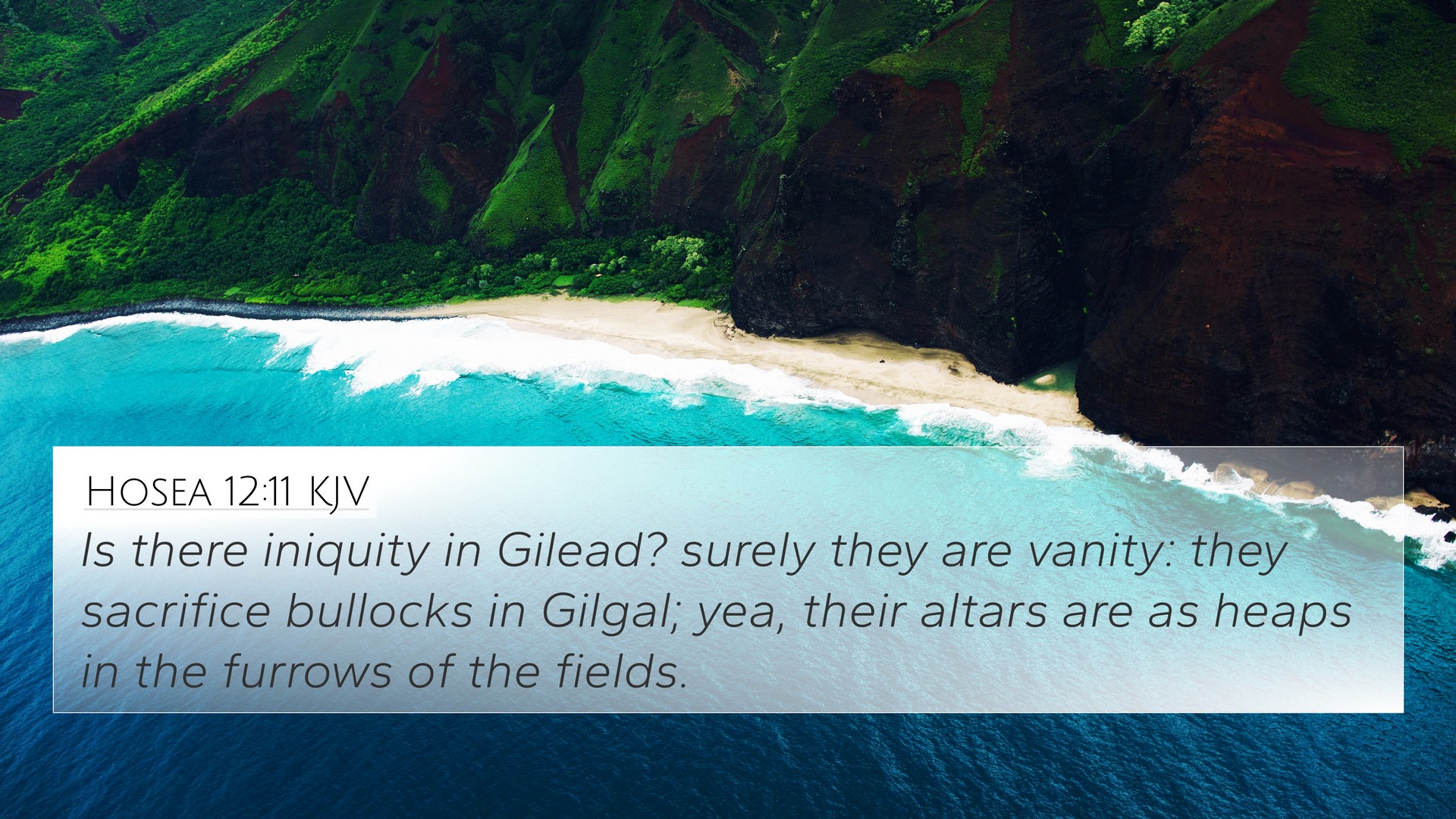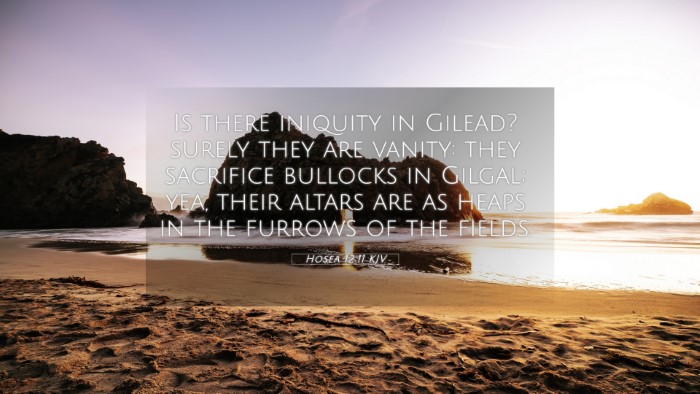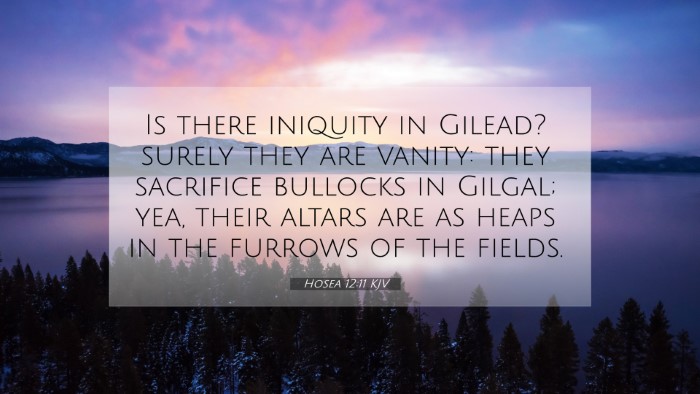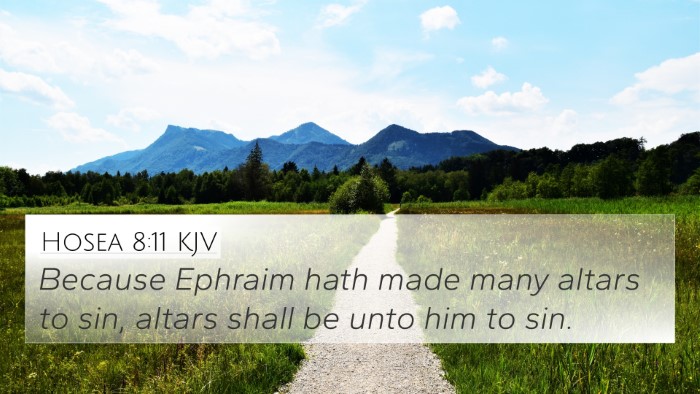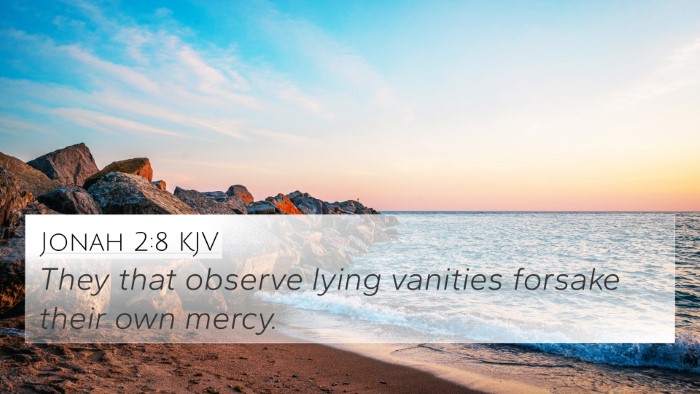Old Testament
Genesis Exodus Leviticus Numbers Deuteronomy Joshua Judges Ruth 1 Samuel 2 Samuel 1 Kings 2 Kings 1 Chronicles 2 Chronicles Ezra Nehemiah Esther Job Psalms Proverbs Ecclesiastes Song of Solomon Isaiah Jeremiah Lamentations Ezekiel Daniel Hosea Joel Amos Obadiah Jonah Micah Nahum Habakkuk Zephaniah Haggai Zechariah MalachiHosea 12:11 Similar Verses
Hosea 12:11 Cross References
Is there iniquity in Gilead? surely they are vanity: they sacrifice bullocks in Gilgal; yea, their altars are as heaps in the furrows of the fields.
Uncover the Rich Themes and Topics of This Bible Verse
Listed below are the Bible themes associated with Hosea 12:11. We invite you to explore each theme to gain deeper insights into the Scriptures.
Hosea 12:11 Cross Reference Verses
This section features a detailed cross-reference designed to enrich your understanding of the Scriptures. Below, you will find carefully selected verses that echo the themes and teachings related to Hosea 12:11 KJV. Click on any image to explore detailed analyses of related Bible verses and uncover deeper theological insights.
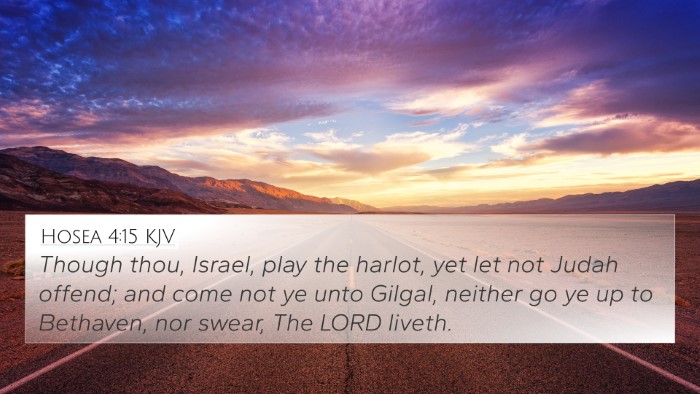
Hosea 4:15 (KJV) »
Though thou, Israel, play the harlot, yet let not Judah offend; and come not ye unto Gilgal, neither go ye up to Bethaven, nor swear, The LORD liveth.
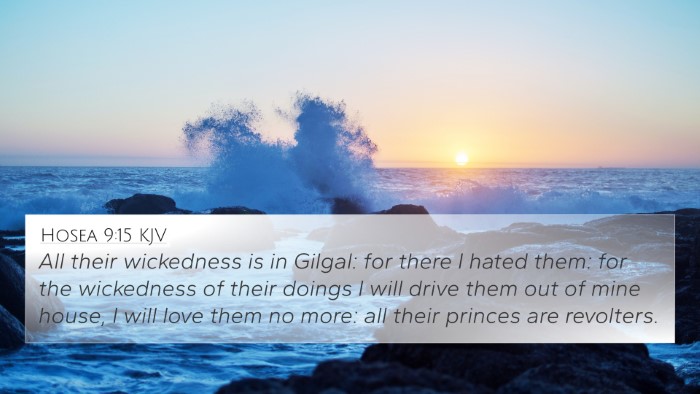
Hosea 9:15 (KJV) »
All their wickedness is in Gilgal: for there I hated them: for the wickedness of their doings I will drive them out of mine house, I will love them no more: all their princes are revolters.
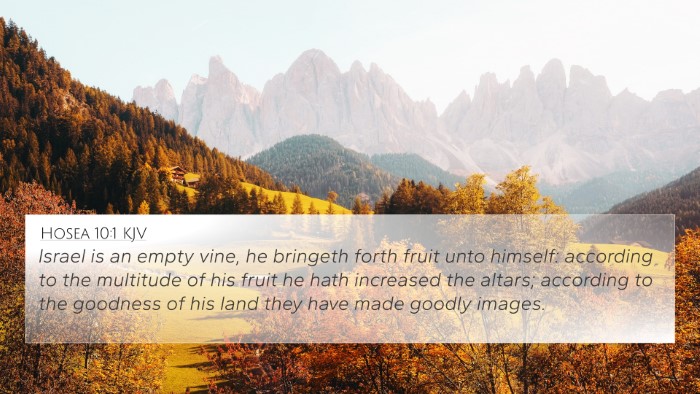
Hosea 10:1 (KJV) »
Israel is an empty vine, he bringeth forth fruit unto himself: according to the multitude of his fruit he hath increased the altars; according to the goodness of his land they have made goodly images.
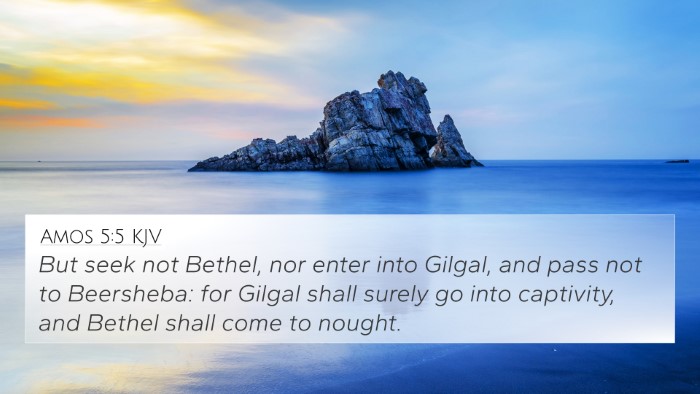
Amos 5:5 (KJV) »
But seek not Bethel, nor enter into Gilgal, and pass not to Beersheba: for Gilgal shall surely go into captivity, and Bethel shall come to nought.
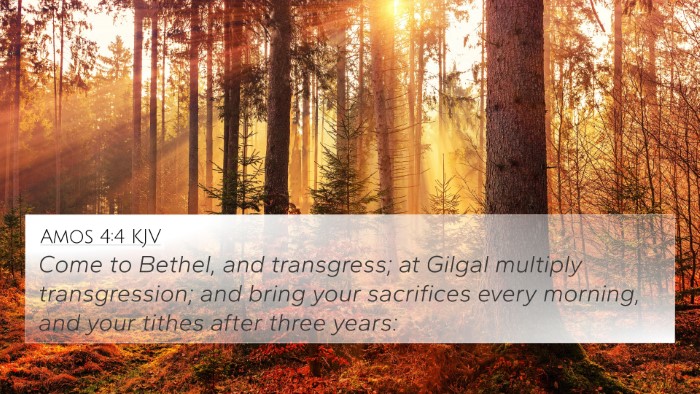
Amos 4:4 (KJV) »
Come to Bethel, and transgress; at Gilgal multiply transgression; and bring your sacrifices every morning, and your tithes after three years:
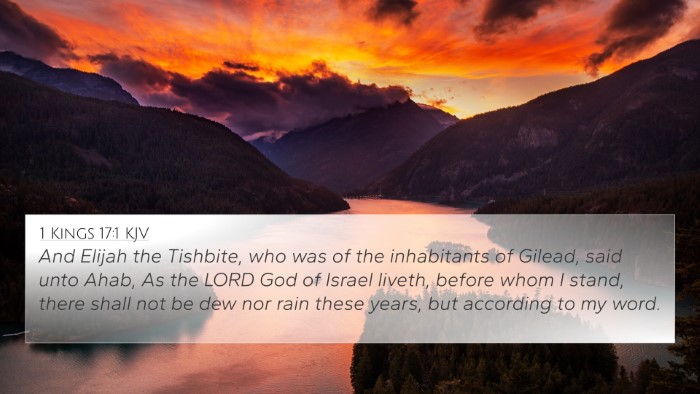
1 Kings 17:1 (KJV) »
And Elijah the Tishbite, who was of the inhabitants of Gilead, said unto Ahab, As the LORD God of Israel liveth, before whom I stand, there shall not be dew nor rain these years, but according to my word.
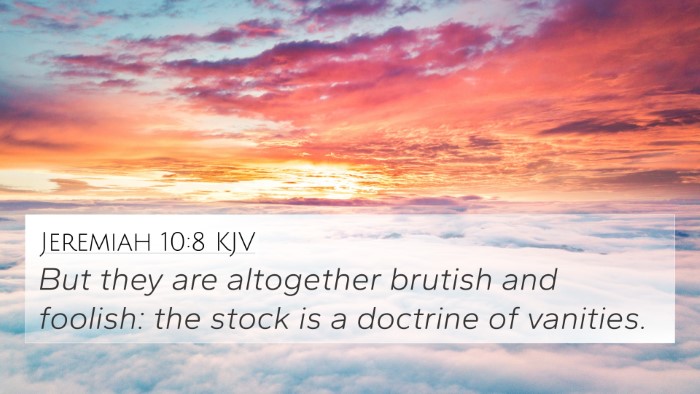
Jeremiah 10:8 (KJV) »
But they are altogether brutish and foolish: the stock is a doctrine of vanities.
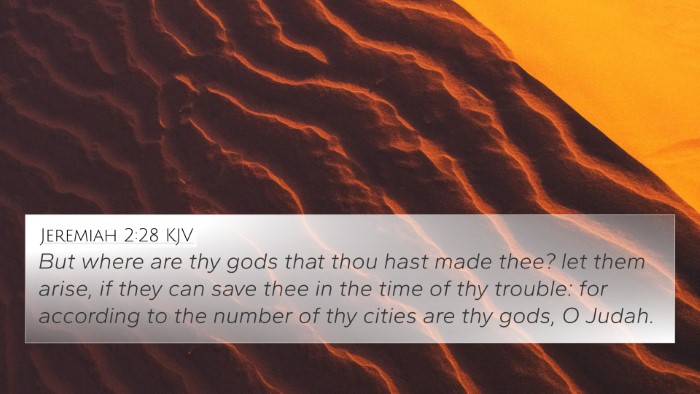
Jeremiah 2:28 (KJV) »
But where are thy gods that thou hast made thee? let them arise, if they can save thee in the time of thy trouble: for according to the number of thy cities are thy gods, O Judah.
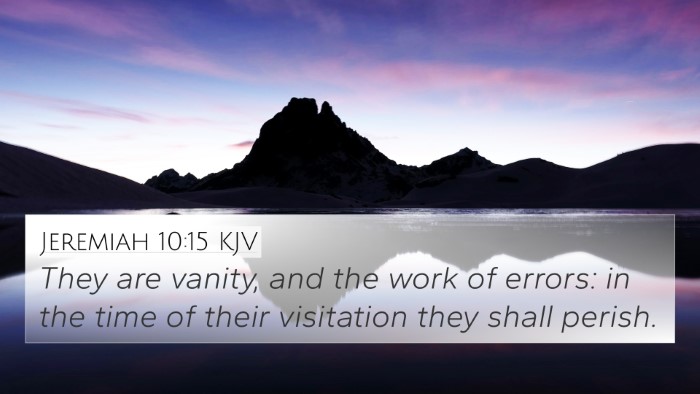
Jeremiah 10:15 (KJV) »
They are vanity, and the work of errors: in the time of their visitation they shall perish.
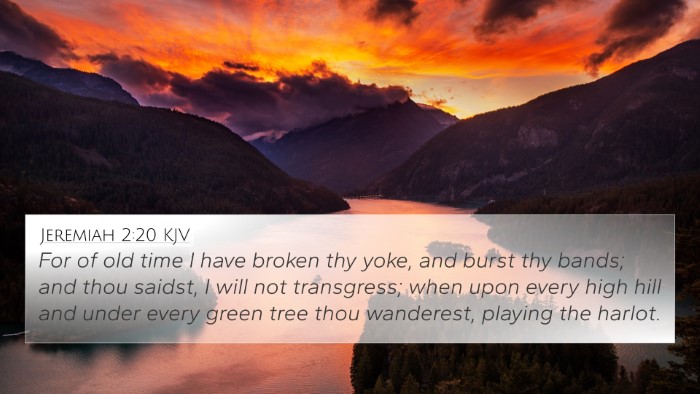
Jeremiah 2:20 (KJV) »
For of old time I have broken thy yoke, and burst thy bands; and thou saidst, I will not transgress; when upon every high hill and under every green tree thou wanderest, playing the harlot.
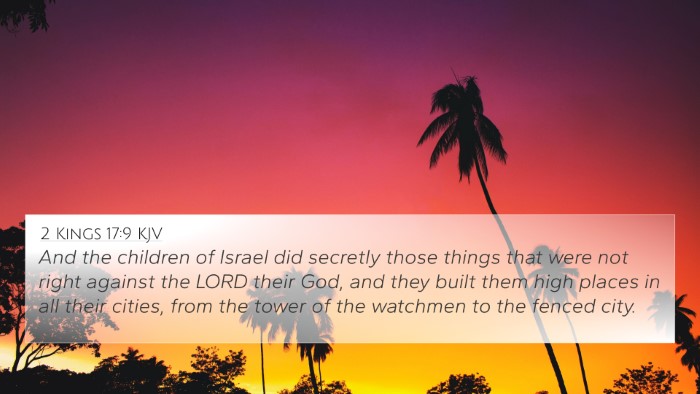
2 Kings 17:9 (KJV) »
And the children of Israel did secretly those things that were not right against the LORD their God, and they built them high places in all their cities, from the tower of the watchmen to the fenced city.
Hosea 12:11 Verse Analysis and Similar Verses
Understanding Hosea 12:11
Hosea 12:11 states: "Is there iniquity in Gilead? Surely they are vanity; they sacrifice bullocks in Gilgal; yea, their altars are as heaps in the furrows of the fields." This verse provides profound insights into the spiritual state of Israel and serves as a reflection on the nature of true worship.
Contextual Background
The Book of Hosea, written by the prophet Hosea, addresses the themes of rebellion, judgment, and mercy. It is crucial to understand that Hosea's ministry occurred during a turbulent time in Israel’s history, marked by idolatry and social injustice.
Verse Explained
In Hosea 12:11, the prophet highlights:
- Iniquity in Gilead: The mention of Gilead symbolizes the moral decay and hypocrisy present among the people, who claim to worship yet engage in immoral practices.
- Vanity of Sacrifice: Their sacrifices are ineffectual, rooted in vanity rather than genuine faith. This reflects a broader theme throughout the Bible where empty rituals fail to please God.
- Heaps in the Furrows: The imagery of altars as heaps of stones alludes to disarray and a lack of authentic worship, contrasting the true spiritual state of the community.
Connections to Other Scriptures
Hosea 12:11 can be understood through cross-references to various biblical texts. The act of comparing scripture enhances understanding through inter-biblical dialogue. Here are some relevant connections:
- Isaiah 1:11-13: A similar rebuke of meaningless offerings highlights God's disdain for superficial worship.
- Amos 5:21-24: God expresses a desire for justice rather than mere sacrifice, echoing the sentiments of Hosea.
- Micah 6:6-8: The question of what God requires further emphasizes moral living over ritual sacrifice.
- Jeremiah 7:21-23: This passage critiques unfaithful sacrifices and underscores obedience over offerings.
- Matthew 15:8-9: Jesus quotes Isaiah, highlighting the continuity of this theme into the New Testament.
- Romans 12:1: Paul reinterprets sacrifice as living a life dedicated to God, drawing from Old Testament principles.
- Hebrews 10:5-7: This passage affirms that God desires the heart of worship rather than mere ritual.
Comparative Analysis
By conducting a comparative Bible verse analysis, we see that Hosea 12:11 highlights a persistent biblical theme of the need for sincerity in worship. Throughout scripture, God prioritizes the heart's intention over the act itself.
Thematic Connections
This verse serves as a thematic anchor, encouraging believers to reflect on their worship practices. Key themes include:
- Authenticity in Worship: True worship stems from a genuine relationship with God.
- Judgment against Hypocrisy: God continuously calls out those who replace sincere faith with mere rituals.
- Call to Repentance: Hosea’s overall message urges God’s people to return to Him with sincerity.
Conclusion
The insights derived from Hosea 12:11 and its connections with other scriptures reveal the importance of a heartfelt relationship with God over empty rituals. For anyone studying scripture, engaging with these cross-references can deepen understanding and offer a richer spiritual life.
